- Home
- Richard Lee Byers
The Ruin
The Ruin Read online
THE ELVES RAISED A SECRET CITADEL
It was delightful. It was vengeance, if only vicariously, and to this day, I regret that, dwelling alone in the barrens, I missed the beginning of it. Soon enough, though, I sensed a change in the world, and started investigating. I discovered dragons everywhere running amok, laying waste to their own dominions, slaughtering their chattels and protectors, and in their wanton, reckless bloodlust, leaving themselves vulnerable to their foes. I picked off several myself, when I had the chance.
I suspected the elves had unleashed some manner of curse, for of all the slave races, they possessed the most powerful magic. But if they were responsible, they’d covered their tracks well. Those I put to the question had no knowledge of it, and I couldn’t approach the enchanters, diviners, and lords who might.
THE YEAR OF
ROGUE DRAGONS
Richard Lee Byers
Book I
The Rage
Book II
The Rite
Book III
The Ruin
Realms of the Dragons
Edited by Philip Athans
Realms of the Dragons II
Edited by Philip Athans
Other FORGOTTEN REALMS Titles by Richard Lee Byers
The Haunted Land R.A. Salvatore’s
Book I War of the
Unclean Spider Queen
Book I
Dissolution
Book II
Undead The Rogues
The Black Bouquet
Book III Sembia
Unholy The Halls of Stormweather
The Shattered Mask
For Mark
Acknowledgments
Thanks to Phil Athans, my editor;
to Eric Boyd for pointing me to useful references; and to
Ed Greenwood, for all his help and inspiration.
2 Eleint, the Year of Rogue Dragons (1373 DR)
A frigid wind, too cold for summer’s end, whistled out of the west, making Stival Chergoba shiver inside his bearskin cloak. Pale, shifting lights danced across the night sky, resembling the green and purple radiance that sometimes shined in the north. Those western lights, however, were white and blue. The colors of ice.
The stocky gray-eyed ranger was on watch, so it was his duty to report the supernatural phenomena. He tramped to the clearing at the center of the sacred grove, only to discover that, as usual, he needn’t have bothered. The thirteen druids had already sensed the coming attack and commenced preparations to counter it. Madislak Pemsk, the leader of the coven, a stooped old man with a blotchy bald crown, a beak of a nose, and a ratty brown robe, spoke a word of power and stuck the end of his staff into a pile of wood, whereupon the fuel burst into flame. A younger priest, blond and fair-skinned like Stival himself—and most everyone else in Sossal—put his lips close to the trunk of an oak and whispered. Eyes closed, movements slow and sinuous, a pretty female mystic in a brief, sleeveless tunic danced, saluting the cardinal points with a bronze sickle.
It’s all right for them, Stival reflected. This is their kind of fight, and they all have something meaningful to do.
He didn’t. He possessed his own mystical abilities, charms passed down from previous generations of scouts and hunters, but none that could influence the outcome of a struggle such as the one they faced.
What he could do, as his ivory-colored scale armor attested, was kill dragons, and that was what he should have been doing. White wyrms had done harm to Sossal for as long as anyone could remember, but never more than this year, when they’d all run mad at once. His homeland needed warriors to combat them.
But it also needed circles of druids to fend off the constant threat from the west, and the barons believed the spellcasters in turn required men-at-arms to guard them. So Stival had reluctantly gone where his masters bade him, while other warriors won renown—and the gold, land, and admiration of beautiful women that often accompanied it—confronting the dragon flights.
In years past, Stival had enjoyed such rewards himself, but squandered them all through various indiscretions. Accordingly, he needed more, but it seemed unlikely he would achieve them anytime soon.
Well, no point brooding about it. Not when he still had tedious, pointless tasks to perform. He stalked back to the edge of the wood, where he had a clear view of the terrain beyond, and the glowing sky above.
In time, a ghostly giantess coalesced from the rippling sheets of blue and silver phosphorescence. Since his arrival at Ironspring Grove, Stival had seen the apparition half a dozen times. But even so, he caught his breath, for the spectacle was one element of his current existence that hadn’t come to bore him. Pale and slender, clad in a billowing gown with a plunging neckline, the phantom was perfect, beautiful even though her expression conveyed nothing of softness, humor, or affection—nothing, in fact, but cold determination and avidity. The druids insisted she wasn’t a goddess, merely the image of a spellcaster like themselves painted large against the sky, but Stival still found it difficult to credit.
Her mouth moved, and her hands swept through mystic figures. In the center of the grove, the druids chanted counterspells. The wind gusted, continually reversing direction, cold one second and warmer the next. Branches rattled, and leaves tore free.
In an hour or two, the apparition would fade away, the winds would quiet, and everything would be as it had been before. It had happened that way without fail ever since the magical confrontations began, a decade before. Thus, though he remained alert, Stival swarmed up into the crotch of a blueleaf tree and settled himself to watch the phantom without trepidation or alarm.
Then she looked down at him.
Or peered downward, anyway. She couldn’t really be looking at him, because that wasn’t actually her looming over the earth, just a sort of shadow. Even if it had been, she would hardly have noticed him any more than an ordinary person would spy an ant creeping in the dark a mile away.
Yet it was strange. She’d never stared downward before, and irrational as it seemed, he couldn’t shake the feeling she was gazing straight at him. His guts believed it, even if his head rejected the possibility.
Then the phantom spoke to him.
Her soprano voice, dulcet and low, seasoned with a trace of the accent of some distant land, emerged from the howl of the freezing wind. Perhaps it had always been hidden there, and he just hadn’t heard it until then.
No need for concern, she crooned. Everything’s all right.
Some diminishing piece of him knew she was lying, but it wasn’t the part in control of his tongue. He sighed away the breath he might have used to shout a warning and slumped as his muscles went slack and heavy.
Then, for the first time ever, he saw her smile. That’s good, my darling boy, she told him. That’s very good.
He smiled in return, and savored the contentment that came with her approval. Until he spotted the dark shapes silhouetted before her immense and luminous form like tiny stains on her dress. They were hard to make out amid the glow, especially with his mind blank and sluggish, but he’d spent too many years fighting wyrms not to recognize dragons on the wing.
It’s all right, the phantom murmured. The drakes are my children, too. They won’t hurt you.
For a moment, Stival was relieved to hear it. But his memories wouldn’t let him slip back into lassitude. Though still a relatively young man, he’d seen too many folk fall beneath the dragons’ fangs and claws. Like everyone in Sossal, he had abundant reason to hate and dread the reptiles, and no one could convince him they were harmless, not even—
He realized he was gasping as if he’d run for miles, and likewise shivering with cold. At some point, a crust of frost, a manifestation, perhaps, of the apparition’s magic, had frozen over his garments and ex
posed skin.
What mattered, though, was that he’d shaken off the enchantment. He peered about and saw with a jab of fear that only he had been so fortunate. Most of his comrades had come to the edge of the wood, the better to watch the phantom, and covered in rime, they still stood motionless and entranced. Meanwhile, the onrushing wyrms had nearly reached the grove.
Stival snatched for the curved rothé horn hanging at his hip. One of the druids had fashioned the trumpet, and supposedly, its call could bolster a warrior’s strength and courage. Praying it would likewise break the phantom’s mystical hold on his comrades, Stival pressed the cold brass mouthpiece to his lips and blew with all his might.
The horn blared. Men-at-arms stirred, then cried out as they realized dragons were nearly upon them. A few bolted. The rest frantically readied their weapons. Stival jumped down from the blueleaf, strung his longbow, and rattled off a charm. The reptiles, big as houses and pale as bone, touched down just beyond the edge of the wood, then lunged into the trees.
A crested, wedge-shaped head with a beaklike snout swiveled toward Stival. It cocked back at the end of its swelling, serpentine neck. Stival wrenched himself behind the blueleaf.
The blast of frost, the white’s breath weapon, screeched at him. The cold pierced him to the marrow, but the tree shielded him from some of the effect, and the charm he’d cast, a protection against chill and ice, blunted the rest.
He jabbered a spell, nocked an arrow, looked around the blueleaf, and loosed the shaft. It hurtled straight at the reptile’s silvery, slit-pupiled eye, but the creature twitched its head to the side and so saved its sight. Still, the missile stabbed deep into its mask. Thanks to his ranger magic, the white’s armor of scale and hide had proved no more protective than parchment.
It roared and charged, the edges of its folded, upraised bat wings snagging branches and snapping them to shreds, its long strides shaking the ground. Scrambling backward, Stival kept shooting. His second arrow glanced off its scales. The third lodged in its chest, but didn’t slow it down.
Stival tossed aside the bow and drew his broadsword, for all the good it was likely to do. The bards liked to sing about lone heroes besting wyrms in close combat, but he didn’t know anyone who’d managed the trick in real life. To think that mere minutes ago, he’d been wishing for a battle against dragons. By the Forest Queen, what an idiot he was!
The white crouched, gathering itself to pounce. Then a volley of whistling arrows battered its flank. It pivoted toward the source of the harassment, and darts of green light pierced it. A dazzling, crackling thunderbolt blazed into its long, sinuous body and out the other side. The druids’ protectors were all warriors and rangers, but a few were wizards as well, and two of these had assailed the wyrm with their magic. The creature collapsed and thrashed, crushing brush and saplings beneath it, nearly doing the same to Stival before he jumped clear.
He turned to grin his thanks to the friends who’d saved him from what had seemed certain death, then bellowed a warning instead. Because their own death was streaking in to take them from behind.
It was the biggest, hence oldest and strongest, white Stival had ever seen. But it was also something more, something that, until then, he’d hoped only existed in tales of horror and woe. Patches of slimy rot mottled its hide, and bone gleamed through rents in the skin. Its wings hung in tatters, and the sunken eyes glowed. It could only be a dracolich, a wyrm that had embraced undeath and in so doing, amplified its natural might tenfold.
Stival’s warning did no good. His comrades had grouped together to coordinate their efforts and protect each other’s backs, but the close formation doomed them. When the dracolich sprang in among them, it crushed half a dozen beneath its bulk, and only needed a heartbeat or so to massacre the rest. The gnashing jaws bit an archer in two. Snatching talons tore other men to fragments. Wings hammered, swatting the warriors beneath. The long tail lashed back and forth, smashing everything in its path, flinging broken bodies through the air.
The dracolich gave Stival a leer. A length of ice like a glittering spear materialized in the air before it, then shot toward the ranger.
Stival tried to dodge, but to no avail. The missile slammed into his chest and exploded, jabbing pain and chill through his torso and peppering his face with flying bits of ice. The impact threw him down onto his back.
He was still alive, however. His armor, charm of protection, and luck had saved him yet again. But he knew that if he wanted to stay alive, his only chance was to play dead. He lay still, and watched the dracolich through slitted eyes.
The dead thing cocked its head, regarding him. Terrified, he realized he was mad to think he could fool a dragon in that way. Their senses were too keen. It surely heard the breath whispering in and out of his nostrils, the heart pounding in his—
The dracolich whirled and bounded off. Either it had been too certain of its kill to really scrutinize the fallen man, or some more enticing opportunity for slaughter had lured it away.
Gritting his teeth at the pain of his injuries—he hoped they were only bruises, perhaps a cracked rib or two, and nothing worse—Stival clambered to his feet, looked around, and despaired at what he saw. As best he could judge amid the chaos, four wyrms had attacked the grove. The garrison likely would have fallen to such an onslaught under the best of circumstances. Denied the chance to prepare, they had no chance at all. They’d been lucky enough to kill one young-ish reptile, but the other wyrms were butchering them by the second. A white struck, caught a spearman in his jaws, and swallowed him whole. Conjured hailstones battered archers bloody, and a plume of pearly dragon breath froze several warriors in their tracks.
It was plain they couldn’t hold. They could only hope to buy time for the druids to flee.
But, Stival wondered, would the priests do that? Intent on their rituals, their awareness focused on spirits and forces extant on other levels of reality, did they even realize the grove was under attack? Even if they did, they might not sense that dragons were responsible. In which case, they might head toward the danger to aid in the defense.
Stival blew the retreat on his trumpet, then shouted, “Fall back! Warn the druids!”
He whirled and ran. Others followed. On the other side of the battlefield, the dracolich snarled. The air birthed swirls of thick gray fog, masking everything beyond arm’s reach. The cold vapor had a measure of solidity—when Stival plunged into it, it was like trying to push through wet blankets drying on a clothesline—and its touch covered the ground in slippery frost. With every stride, his feet threatened to fly out from underneath him.
He’d never reach the druids that way—not without more magic of his own. He recited one charm, then another, the ranger spells momentarily suffusing the air with the smells of earth and verdure. When he dashed onward, his stride was longer and quicker, and his balance more sure.
But still, the near-blindness hindered him. The fog resounded with the screams of men dying close at hand, and he tried not to think about the fact that, at that very instant, a dragon could be closing in on him, or he could be running straight at it, and he’d never know until it was too late.
Finally he burst out of the fog and sprinted onward. A handful of other men also made it out, and they pounded along behind him.
As he’d feared, the druids still lingered in the clearing at the heart of the wood, and were making preparations to join the fight. Madislak murmured a spell that sent a gray cast washing through his skin, as if it had turned to rock. Another druid sprouted quills from his left hand, while a third dropped to all fours and melted into an enormous wolf.
“No,” Stival wheezed, his battered torso aching even worse. “Dragons are attacking. You need to run.”
The priest with the spines on his hand frowned. “Leaving you warriors to fight alone? Absolutely not.”
“You don’t understand,” Stival said. “One wyrm is a dracolich, and none of them are reckless or stupid with frenzy. Somehow, they’re coopera
ting with that bitch up in the sky. It’s bad, and you have to get away. In the days to come, the land will need you.”
“He’s right,” said another warrior, speaking with difficulty, swaying on his feet. His right profile looked pallid and frostbitten, and it was clear from the way he angled his head that the milky eye on that side was blind. “Most of the company have already died—”
The dracolich sprang out of the trees.
“Go!” Stival shouted. “Save yourselves!” He charged the colossal creature, and the other warriors, possibly all that remained of the garrison, did the same.
Attack a wyrm when you can come at its flank or rear, and scramble clear when it wheels to face you. Those were the standard tactics, but they didn’t help. The dracolich was simply too fast and powerful. Its snapping fangs and raking claw attacks were too cunning to dodge, and invariably tore their targets to shreds. Indeed, even its stare was perilous. The swordsman with the ruined eye met its gaze and froze in position. Off balance, he fell, and the lich raised its foot high and stamped him to pulp.
At least, Stival thought, the druids were running. One caressed the trunk of a pine and vanished. Another read from a parchment, then shot down into the solid ground as if plummeting into a hole. Others shrank into the shapes of owls or bats and took flight. Someone conjured a mass of twisted, thorny brambles to hinder pursuit. Maybe at least some of them would get away.
One, however, wasn’t even trying. Madislak brandished his staff and chanted, and Stival felt a surge of strength and vitality tingle through his muscles. Presumably the other surviving warriors experienced the same. Their sword and axe strokes, which had glanced off the dracolich’s milky scales most of the time, started to penetrate more often.
It didn’t matter, though. The creature kept right on slaughtering them. When Madislak shouted a word of power, blue and yellow flames exploded into being all along the lich’s back, but died instantly, without burning it in the slightest.

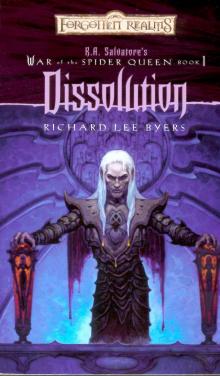 Dissolution
Dissolution Arkham Horror- Ire of the Void
Arkham Horror- Ire of the Void The Haunted Lands: Book II - Undead
The Haunted Lands: Book II - Undead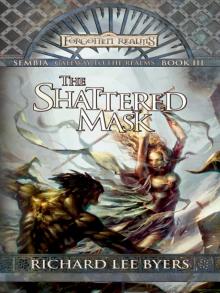 The Shattered Mask
The Shattered Mask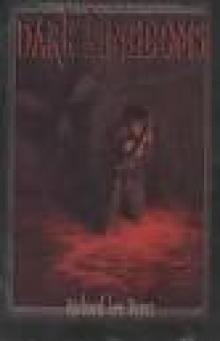 Dark Kingdoms
Dark Kingdoms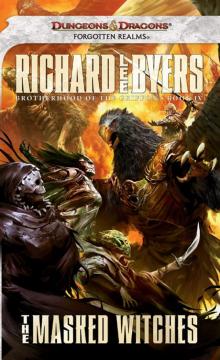 The Masked Witches: Brotherhood of the Griffon, Book IV
The Masked Witches: Brotherhood of the Griffon, Book IV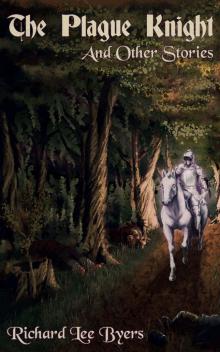 The Plague Knight and Other Stories
The Plague Knight and Other Stories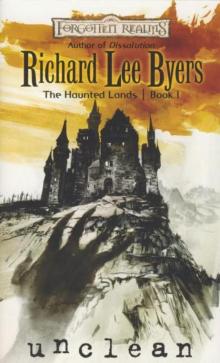 Unclean: The Haunted Lands
Unclean: The Haunted Lands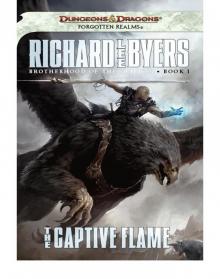 The Captive Flame: Brotherhood of the Griffon • Book 1
The Captive Flame: Brotherhood of the Griffon • Book 1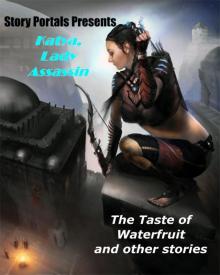 The Taste of Waterfruit and Other Stories (Story Portals)
The Taste of Waterfruit and Other Stories (Story Portals)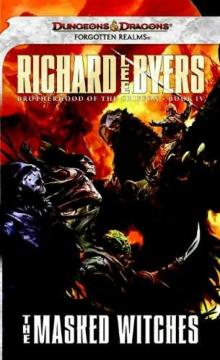 The masked witches botg-4
The masked witches botg-4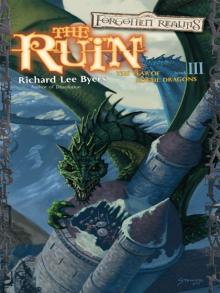 The Ruin
The Ruin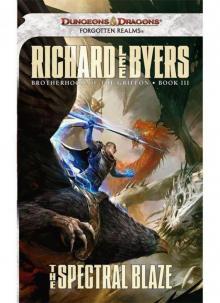 The Spectral Blaze botg-3
The Spectral Blaze botg-3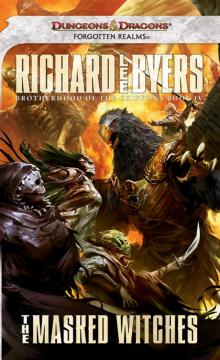 The Masked Witches
The Masked Witches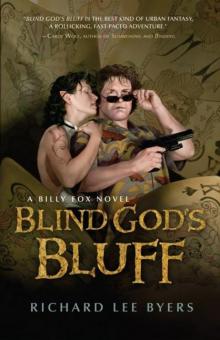 Blind God's bluff bf-1
Blind God's bluff bf-1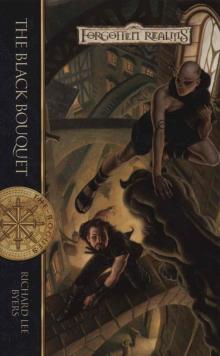 The Black Bouquet r-2
The Black Bouquet r-2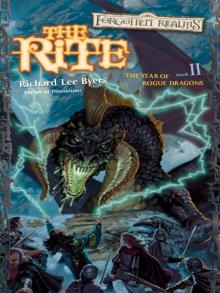 The Rite
The Rite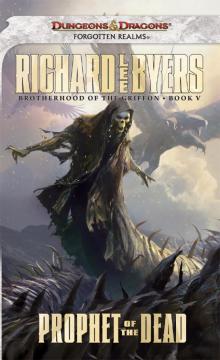 Prophet of the Dead: Forgotten Realms
Prophet of the Dead: Forgotten Realms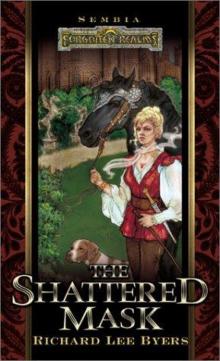 The Shattered Mask s-3
The Shattered Mask s-3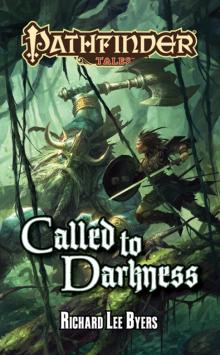 Called to Darkness
Called to Darkness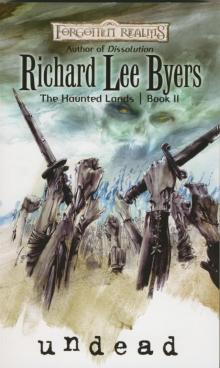 Undead hl-2
Undead hl-2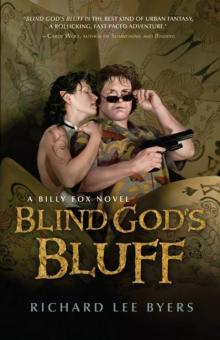 Blind God's Bluff: A Billy Fox Novel
Blind God's Bluff: A Billy Fox Novel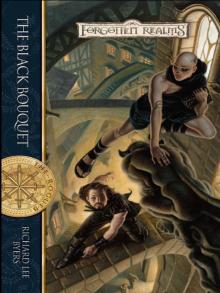 The Black Bouquet
The Black Bouquet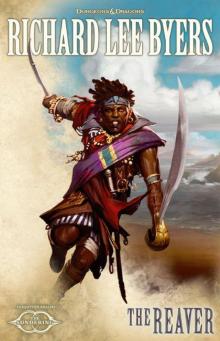 The Reaver
The Reaver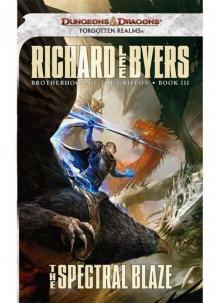 The Spectral Blaze: A Forgotten Realms Novel
The Spectral Blaze: A Forgotten Realms Novel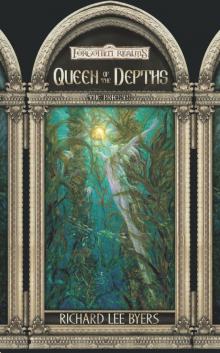 Queen of the Depths
Queen of the Depths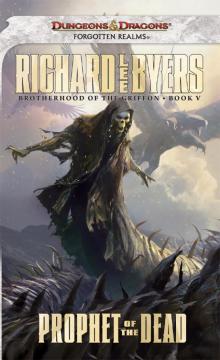 Prophet of the Dead botg-5
Prophet of the Dead botg-5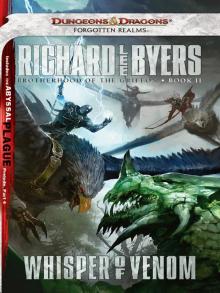 Whisper of Venom: Brotherhood of the Griffon, Book II
Whisper of Venom: Brotherhood of the Griffon, Book II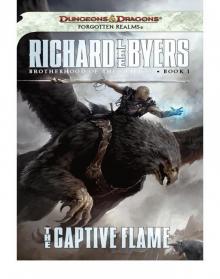 The Captive Flame botg-1
The Captive Flame botg-1 The Haunted Lands: Book III - Unholy
The Haunted Lands: Book III - Unholy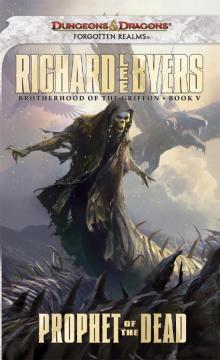 Prophet of the Dead
Prophet of the Dead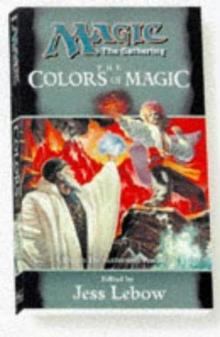 The Colors of Magic Anthology (magic: the gathering)
The Colors of Magic Anthology (magic: the gathering)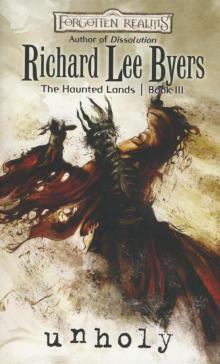 Unholy hl-3
Unholy hl-3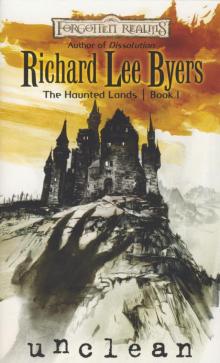 Unclean hl-1
Unclean hl-1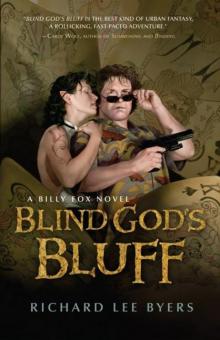 Blind God's Bluff
Blind God's Bluff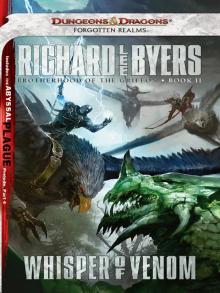 Whisper of Venom botg-2
Whisper of Venom botg-2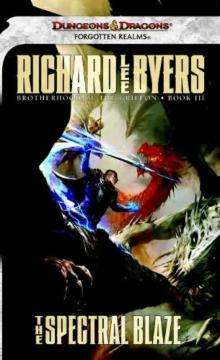 The Spectral Blaze
The Spectral Blaze